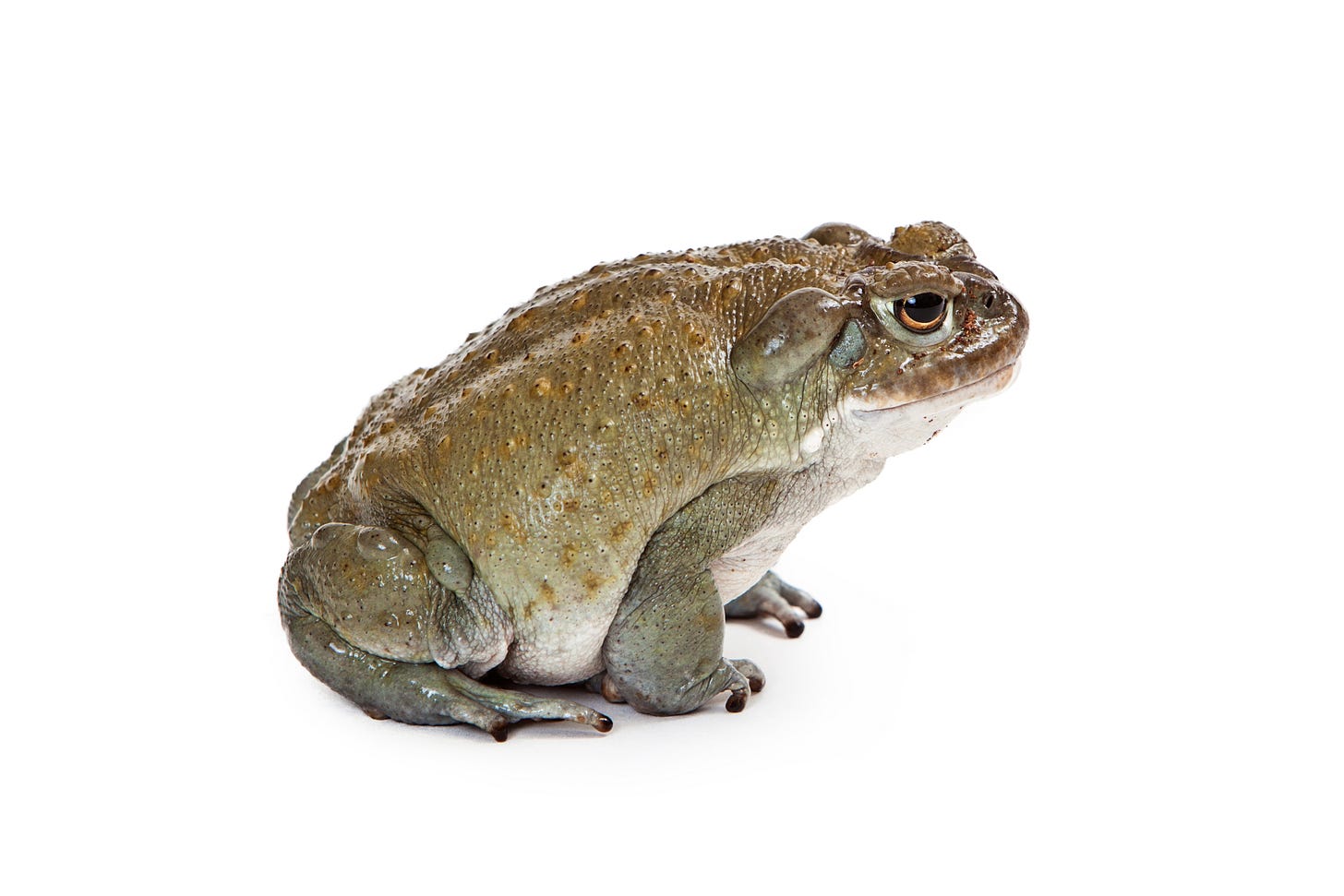The psychedelic hype cycle, MindMed co-founder sues fellow co-founder, and patenting toad secretions
Plus: The Latest in Oregon, and could hype hurt clinical trials?
Happy Friday, and welcome back to The Microdose.
Who owns toad secretions? Washington-based psychedelic start-up CaaMTech filed a patent application in July 2020 for “toad secretion tryptamines,” including 5-MeO-DMT, to treat “a psychological disorder, a compulsive disorder, or a depressive disorder.” (CaaMTech has been public about their work on 5-MeO-DMT analogs since at least 2021.) The patent application makes broad claims that cover many tryptamines derived from toad secretions, and includes a wide range of the ratios and amounts of each tryptamine used. The patent application also lays claim to unspecified “methods” for treating several types of disorders with these formulations.
The psychedelic hype cycle. Psychedelic research is “trapped in a hype bubble,” Johns Hopkins researchers write in an op-ed published in JAMA Psychiatry last week. The authors reference the Gartner Hype Cycle, a theory psychedelic newsletter Trip Report’s Zach Haigney has described as “the narratives, waves of investment, and eventual adoption of new technologies.” Using the hype cycle as a guide, psychedelics may be close to maximum hype, or what the theory identifies as a “peak of inflated expectations.” “After the peak comes an equally steep decline in which highly inflated expectations are dashed,” the authors write. While the public’s sentiments will ebb and flow, the authors urge scientists and clinicians to stay the course in producing quality research, and “to counter extreme statements when they spot them.”
There has never been a more exciting – or bewildering – time in the world of psychedelics. Don’t miss a beat.
A free newsletter from the U.C. Berkeley Center for the Science of Psychedelics
MindMed co-founder sues fellow co-founder. Last week, The Microdose reported on psychedelics company Terran Biosciences’ lawsuit alleging that mental health company Compass “misappropriated psilocybin trade secrets” from University of Maryland, Baltimore researcher Scott Thompson. (Terran has an exclusive licensing deal with UMB to commercialize the institution’s patents.) This week, another psychedelics IP grievance became public, and it involves major players in the psychedelics industry.
The complaint was originally filed in California state court in July, and it was moved to Nevada district court last week. In it, psychedelics company MindMed’s co-founder Scott Freeman alleges that his fellow co-founder Stephen Hurst edged him out of the company and devised a strategy for how he and Carey Turnbull, CEO of Ceruvia Biosciences and a major psychedelics philanthropist, “could coordinate the control of their respective companies to form an enterprise benefiting themselves at the expense of Freeman.”
Among Freeman’s claims: Hurst allegedly allowed a patent lease for BOL-148, a non-hallucinogenic analog of LSD used to treat cluster headaches, to lapse, allowing Turnbull to lease the patent instead. (In June, Ceruvia announced it had submitted an investigational new drug application to the U.S. Food and Drug Administration to study BOL-148.) Beyond Hurst and Turnbull, the complaint also names people and companies associated with MindMed, including unknown individuals (listed as Doe 1-20) and companies (listed as Roe 1-20).
Could hype hurt clinical trials? If recent publications are any indication, papers about psychedelic hype are reaching a peak as well. In an article published in Psychopharmacology this week, King’s College London researchers argue that “uncritical promotion (‘hype’) of psychedelics as medicines is not only misleading, but also directly influences participant expectancy in ongoing psychedelic trials.” It’s well-established among researchers that it’s very difficult to adequately “blind” participants in psychedelic studies; most people can tell whether they’ve received a mind-altering psychedelic drug or merely a placebo. Hype around the efficacy of these drugs can lead people in psychedelic studies to have a stronger expectation that psychedelic treatment will work for them.
The researchers also argue that expectancy effects happen with any kind of medication, including placebos — in fact, they write, this happens “even when people are explicitly told they are taking an inert substance.” Nonetheless, they suggest a few possibilities to reduce expectancy effects, including reducing hype in popular culture; adding more participants to studies; providing less explicit information about whether participants could receive a psychedelic drug or placebo; or even administering drugs under general anesthesia. Still, the authors write, “It is unlikely ever to be possible to entirely disambiguate the effects of psychoactive drugs themselves from the expectancy effects that come with them.”
The Latest in Oregon: Measure 109 draft rules released
On September 1, Oregon Psilocybin Services released a draft of final rules for the implementation of Measure 109, which will establish psilocybin services in the state. Starting next week, rules committees will meet to discuss these drafted rules, and public comment will be open for three weeks in November.
So far, some people in the psychedelics space have already raised concerns about licensing fees for those providing psilocybin services:



On Wednesday, San Francisco passed a resolution to “urge” law enforcement to make psychedelic use the lowest priority for the city’s law enforcement.
Psychedelic healthcare company PSYCH spoke with Oregon Psilocybin Services Section Manager Angela Allbee for an overview of Oregon’s Measure 109.
WIRED covers the JAMA Psychiatry article on psychedelic hype and recounts moments over the last year where the hype bubble began to burst.
Lucid News explores the “murky legal landscape” surrounding psychedelic churches.
You’re all caught up! Have a great weekend. We’ll be back in your inbox Monday morning with a new issue of 5 Questions.
If you know anyone who might like the latest on psychedelics in their inbox, feel free to forward this to them, or click below.
Got tips? Email us at themicrodose@berkeley.edu.










Is there any type of study happening on psychedelics and primary headaches? Paroxysmal hemicranea? Trigeminal neuralgia? Thanks🙏🏻